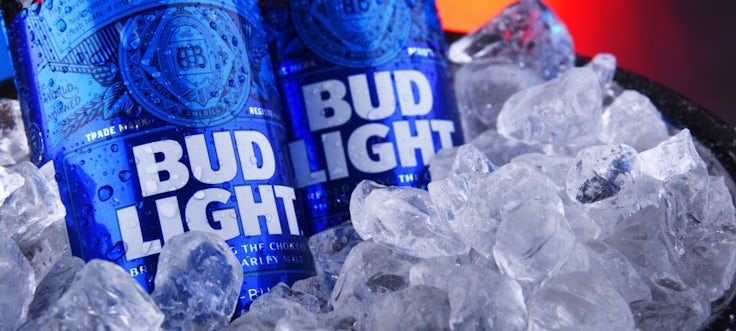Bud Light brand health shows no sign of recovery as impact of backlash persists
Bud Light’s brand health plummeted following the controversy surrounding its partnership with a transgender influencer, with consumers across the board now looking at the brand unfavourably.

Bud Light has seen its brand health plummet in the wake of a boycott by consumers angry at its use of a transgender influencer.
According to YouGov’s BrandIndex shared with Marketing Week, the beer brand’s index score, which is an overall measure of its brand health, dropped to -8.4 in the US as of 11 June. This is significantly down from the same time last year when its score was 7.9.
While Bud Light is a much smaller brand by market share in the UK, the backlash is also having an impact on this side of the Atlantic. Bud Light’s index score dropped from 0.4 on 31 March to -6.2 as of 14 June in the UK.
Problems for the AB InBev-owned brand started in April when Bud Light attracted anger from conservatives in the US after a short-lived partnership with trans influencer Dylan Mulvaney. The brand sent Mulvaney a can of Bud Light with her likeness on it as part of its ‘March Madness’ campaign. A video of the influencer sharing the can went viral and prompted a high-profile backlash, including from musician Kid Rock, who posted a video of himself shooting a can of Bud Light.
While Mulvaney’s video drew negative reactions from conservatives who perceived it as a display of support for trans rights from AB InBev, the company’s response to distance itself from the influencer and its handling of the situation has also been criticised by LGBTQ advocacy groups.
CEO Michel Doukeris made light of the controversy during an investor call, suggesting it was in relation to “one can, one influencer, one post, and not a campaign”. And following the backlash, Bud Light’s marketing vice-president, Alissa Heinerscheid, and vice-president of marketing for its mainstream brands, Daniel Blake, were forced to take a leave of absence.
Doukeris said last month that “the beer itself should not be the focus of the debate,” while North American CEO Brendan Whitworth stated the company wanted to “bring people together”. “We never intended to be part of a discussion that divides people,” he added.

However, it’s not just the perennial haters that now have a problem with AB InBev it seems, as the nationally representative figures from YouGov suggest damage has been done to the Bud Light brand across the board.
The biggest reaction has been among older consumers, with Bud Light’s index score for over-50s plunging to -14.5 from 18.1 last year. The score among younger consumers (18- to 34-year-olds) has also dropped into negative figures (-0.7), although from a much lower base (1.1).
Although the brand has held on to a positive index score among 35- to 49-year-olds (0.9), it has also fallen significantly from 13.3 last year.
It’s now been more than two months since Mulvaney’s original post, yet the data suggests little sign of improvement. This month, the beer also lost its top spot as the best-selling beer in the US, according to figures from consulting firm Bump Williams. Sales were down by almost a quarter for the four weeks ending on 3 June. However, it remains the best-selling brand in the US year-to-date.
In May, AB InBev’s CEO admitted there had been “some spillover” of the Bud Light controversy onto the company’s other brands. However, YouGov’s BrandIndex does not show any notable effect on the brand health of fellow AB InBev brand Stella Artois.
Bud Light’s ad backlash shows the complexity of mass marketing
Last year, the US LGBTQ advocacy group, the Human Rights Campaign Foundation, gave AB InBev a top rating for its inclusion and equality efforts; however, in the wake of the controversy, it has now rescinded this rating.
“When faced with anti-LGBTQ+ and transphobic criticism, Anheuser-Busch’s actions demonstrate a profound lack of fortitude in upholding its values of diversity, equity, and inclusion,” wrote Jay Brown, the organisation’s senior vice-president of programmes, research, and training, in a letter to the company.
While boycotts of the brand have largely been led by conservatives, AB InBev’s response may well have damaged the brand’s health among more liberal Americans too.
Last month, AB InBev told investors it would triple its media investment behind Bud Light this summer. Any efforts to recover brand health so far seem to have been futile.
Among all this controversy, AB InBev has been named creative marketer of the year for the second year running by Cannes Lions.







Comments